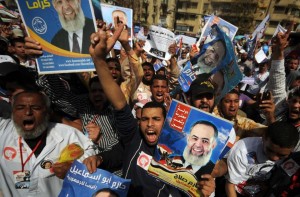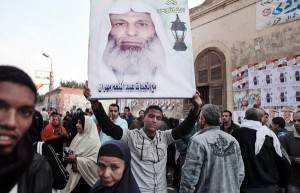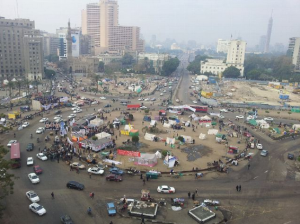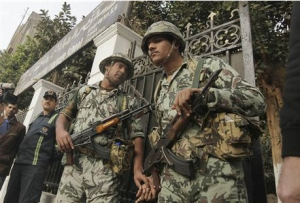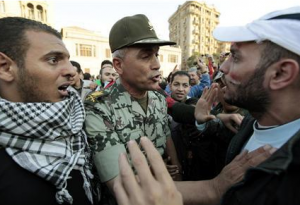Current Situation
On February 9, the Egyptian Armed Forces (EAAF) Spokesperson announced the commencement of a large-scale “comprehensive” military operation to “eliminate all terrorist elements” across the country, called “Operation Sinai 2018”, with special emphasis placed on the Sinai Peninsula, Nile Delta, and Western Desert. The Spokesperson also announced an increase of the country’s alert level due to the operations.
As part of the of the campaign, the Egyptian Air Force (EAF) intensified the frequency of its airstrikes targeting militant hideouts throughout North Sinai Governorate, especially in the Rafah-al-Arish-Sheikh Zuweid triangle and Central Sinai District. The Egyptian Navy increased its activity along Sinai’s coastal region, while heightened security protocols were recorded at ports and border crossings. Security forces also increased presence in the vicinity of vital infrastructure and installations. Reports from February 9 indicate that civilian Suez Canal crossings from mainland Egypt to the Sinai, including by vessel and through tunnels, have been closed to civilian traffic due to the military campaign.
On March 8, the EAAF Spokesperson stated that Operation Sinai 2018 had yielded the deaths of 105 Islamic State (IS)-affiliated Wilayat Sinai fighters and the arrests of hundreds of the group’s militants, and that 16 soldiers had also been killed since the beginning of the campaign. The Spokesperson also announced that the EAAF destroyed 1,907 hideouts and weapon storehouses.
Assessments & Forecast
The Egyptian government has achieved partial success in containing militancy threats over the past year, with a reduction in the overall number of attacks. However, the persistence, albeit reduced frequency, of attacks in North Sinai Governorate and mainland Egypt likely motivated this recent operation, demonstrating efforts to mitigate threats from multiple groups, particularly the IS-affiliate Wilayat Sinai. The large-scale attack at a mosque in North Sinai’s Bir al-Abd on November 24, 2017, which killed over 300 people, also likely triggered the operation, and it took a period of months to prepare and mobilize for the current operation.
However, considering the timing of its commencement and execution, the primary motivation for the military campaign is likely political and connected to the upcoming March 2018 presidential elections, in which President Abdel Fatah al-Sisi is the leading candidate. President al-Sisi likely initiated the operations in order to boost his status among the Egyptian populace and project an image of power, stability, and intensified efforts to tackle the threat of militancy. Al-Sisi also likely timed the operation to deflect domestic and international criticism away from the election’s perceived lack of legitimacy and toward the issue of counter-terrorism, following the withdrawal or arrest of most of his electoral opponents over the past several weeks. To a lesser but still significant degree, the operation was also likely launched to draw attention away from Egypt’s poor economic conditions and towards a different public issue, namely militancy, and measures taken by authorities to tackle it.
The operations also follow international media reports about Israeli airstrikes against Wilayat Sinai in North Sinai in recent years. The Egyptian government likely intends to use the operations to demonstrate their sovereignty over North Sinai Governorate and their ability to mitigate militant threats with their own forces. This is particularly likely in light of the heightened criticism regarding al-Sisi’s close cooperation with Israeli authorities vis-a-vis the threat of militancy stemming from Wilayat Sinai elements.
Strategically, the nationwide campaign aims largely at isolating Wilayat Sinai militants in North Sinai Governorate. The reported closure of Suez Canal crossings to the movement of civilians, as well as the intensified activity by the Egyptian Navy along the Sinai coastal region, are meant to prevent reinforcements and smugglers from aiding Wilayat Sinai militants, thus putting further pressure on the Sunni jihadist militant group in North Sinai Governorate. The heightened security measures in the vicinity of vital infrastructure and installations likely were put in place to prevent reprisal attacks by militants, which in turn, would embarrass the Egyptian authorities.
FORECAST: The EAAF will likely continue implementing a strategy aimed at further isolating Wilayat Sinai militants in their aforementioned strongholds of Central Sinai Distinct and the Rafah-al-Arish-Sheikh Zuweid triangle. By carrying out simultaneous assaults on these two areas, the EAAF likely seeks to fix militants in their positions, preventing them from reinforcing the two respective areas or conducting attacks to the rear of security forces. The intensified aerial bombardments are meant to hamper militant movements, which in turn, may impede their ability to regroup or conduct attacks in order to force the deployment of Egyptian troops away from the frontlines. Furthermore, tighter inspection is liable to be enforced between Egypt and Gaza at the Rafah border crossings.
Israel permitted Egypt to deploy a large amount of forces into Sinai, as according to the 1979 Egypt-Israel Peace Treaty, Israeli permission is required for such a move. This highlights the increased coordination between the two countries, as they both perceived Wilayat Sinai as a strategic threat. In order to complicate and discourage the security coordination between the two countries, Wilayat Sinai may target southern Israel with rocket fire over the coming days and weeks. While in the short-term, the number of Wilayat Sinai attacks may decrease, given precedent of previous operations by the EAAF in North Sinai Governorate, over the coming months the Sunni jihadist militant group will likely renew its elevated activity in the region. The group will likely lower its profile in order to facilitate this, which would enable it to regroup and carry out multiple attacks against Egyptian security forces.
Recommendations
Travel to Cairo and Alexandria may continue while adhering to all security precautions regarding militancy and civil unrest. Consult with us for itinerary-based travel recommendations.
Avoid all travel to the North Sinai Governorate and border areas with Libya, Sudan, and Israel due to the persistent risk for militant attacks, kidnappings, and general lawlessness.
We further advise to avoid nonessential travel to the Southern Sinai Peninsula, while maintaining heightened vigilance in the Suez Canal Zone, the Upper Nile area, and the Nile Delta region due to an increased risk of unrest and the heightened risk of militant attacks. Before traveling to Sharm al-Sheikh, confirm that flight operations are continuing and have not been impacted by recent militant threats.
As a general security precaution, remain vigilant in areas surrounding and avoid the immediate vicinity of government installations, police stations, and religious centers, particularly churches, as these locations remain under elevated threat of militant attacks. When traveling in central squares, or in areas with persistent police deployments, avoid the immediate vicinity of security forces, particularly fixed traffic booths, as such personnel and facilities have increasingly come under attack by militant elements.
